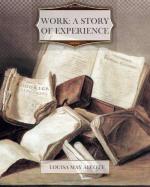“I must go!” cried David with a sort of desperation, as Letty clung to one arm, Christie to the other.
“I shall see you soon: good-by, rny husband,” whispered Christie, setting him free.
“Give the last kiss to mother,” added Letty, following her example, and in another minute David was gone.
At the turn of the lane, he looked back and swung his cap; all waved their hands to him; and then he marched away to the great work before him, leaving those loving hearts to ask the unanswerable question: “How will he come home?”
Christie was going to town to see the regiment off, and soon followed with Mr. Power. They went early to a certain favorable spot, and there found Mrs. Wilkins, with her entire family perched upon a fence, on the spikes of which they impaled themselves at intervals, and had to be plucked off by the stout girl engaged to assist in this memorable expedition.
“Yes, Lisha ‘s goin’, and I was bound he should see every one of his blessed children the last thing, ef I took ’em all on my back. He knows where to look, and he’s a goin’ to see seven cheerful faces as he goes by. Time enough to cry byme by; so set stiddy, boys, and cheer loud when you see Pa,” said Mrs. Wilkins, fanning her hot face, and utterly forgetting her cherished bonnet in the excitement of the moment.
“I hear drums! They’re comin’!” cried Wash, after a long half hour’s waiting had nearly driven him frantic.
The two younger boys immediately tumbled off the fence, and were with difficulty restored to their perches. Gusty began to cry, Ann Elizy to wave a minute red cotton handkerchief, and Adelaide to kick delightedly in her mother’s arms.
“Jane Carter, take this child for massy sake: my legs do tremble so I can’t h’ist her another minute. Hold on to me behind, somebody, for I must see ef I do pitch into the gutter,” cried Mrs. Wilkins, with a gasp, as she wiped her eyes on her shawl, clutched the railing, and stood ready to cheer bravely when her conquering hero came.
Wash had heard drums every five minutes since he arrived, but this time he was right, and began to cheer the instant a red cockade appeared at the other end of the long street.
It was a different scene now than in the first enthusiastic, hopeful days. Young men and ardent boys filled the ranks then, brave by instinct, burning with loyal zeal, and blissfully ignorant of all that lay before them.
Now the blue coats were worn by mature men, some gray, all grave and resolute; husbands and fathers with the memory of wives and children tugging at their heart-strings; homes left desolate behind them, and before them the grim certainty of danger, hardship, and perhaps a captivity worse than death. Little of the glamour of romance about the war now: they saw what it was, a long, hard task; and here were the men to do it well.




